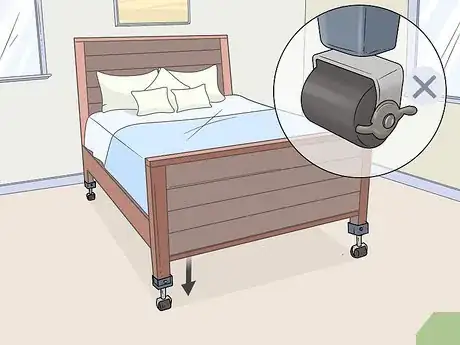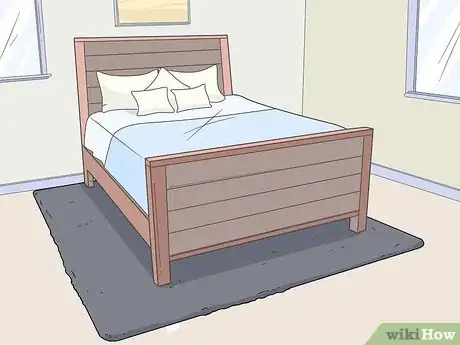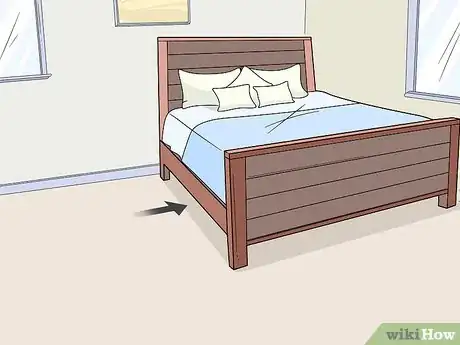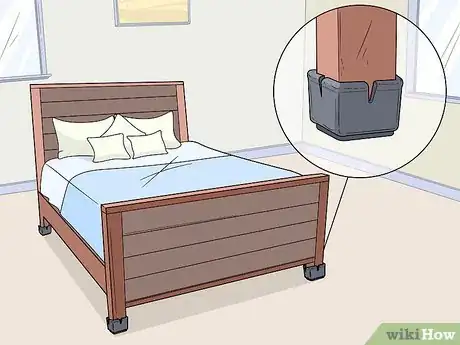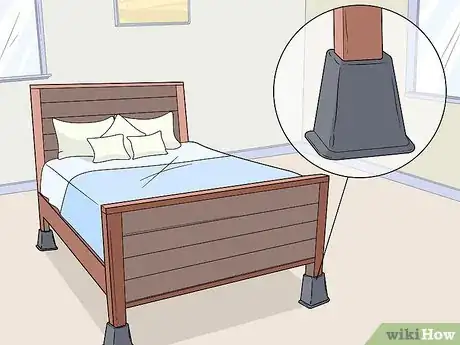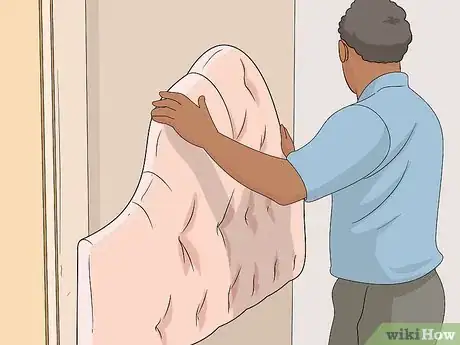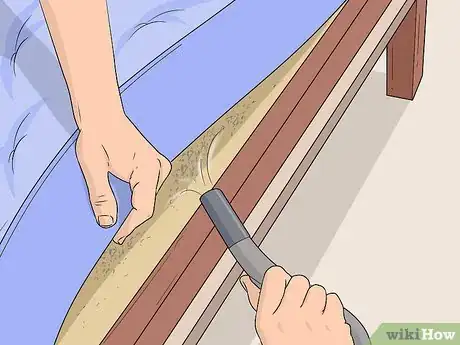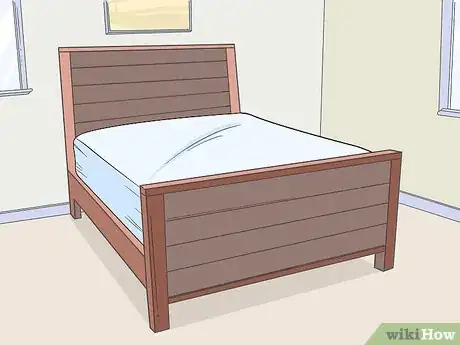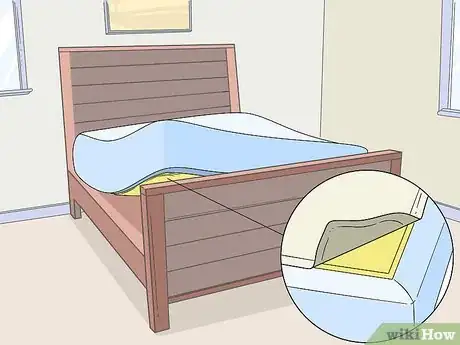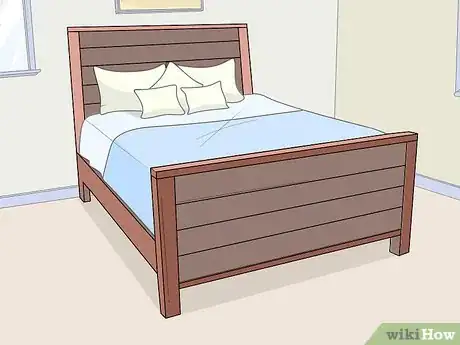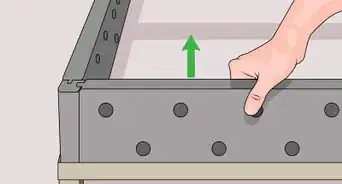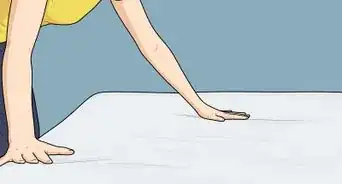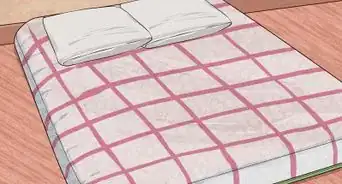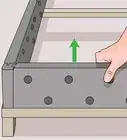This article was co-authored by wikiHow staff writer, Hannah Madden. Hannah Madden is a writer, editor, and artist currently living in Portland, Oregon. In 2018, she graduated from Portland State University with a B.S. in Environmental Studies. Hannah enjoys writing articles about conservation, sustainability, and eco-friendly products. When she isn’t writing, you can find Hannah working on hand embroidery projects and listening to music.
There are 7 references cited in this article, which can be found at the bottom of the page.
This article has been viewed 64,717 times.
Learn more...
Your bed is one of the most important parts of your bedroom. If getting in and out if it causes your frame or mattress to slide around, it can create annoying issues like a saggy mattress or a scratched floor. You can add grippy surfaces to the bottom of your bed frame or underneath your mattress to keep your bed from slipping and sliding around.
Steps
Steadying a Sliding Bed Frame
-
1Remove the wheels if your bed frame has them. Even if you have locked the wheels on your bed frame, they could still be contributing to the problem of your bed frame sliding around. Lift up each leg one at a time and use a screwdriver to unscrew each wheel from the legs of your bed frame.[1]
- Keep the wheels and their hardware in a bag in case you want to add them back onto your bed frame later.
-
2Place an area rug beneath your bed frame. If you have hardwood floors, your bed frame is probably slipping around because it can’t get a good grip. Lift up your bed and slide an area rug underneath it. Make sure the rug is large enough so that all 4 legs of your frame touch it.[2]
- If you don’t have 1 large area rug that you can use, you can put 4 smaller area rugs underneath each leg of your bed frame.
- You can also use rubber pads instead of an area rug for an all-black option.
Tip: An area rug can help tie a room together, especially if you match it with the theme of your bedroom.
Advertisement -
3Position your bed in the corner of the room. If your bed isn’t against the wall, it doesn’t have any additional support to stop it from sliding. Place your bed in the corner of the room with the head against one wall and 1 side against another wall. This should stop your bed from sliding as it hits the wall on either side.[3]
- This positioning can be slightly irritating if there is more than 1 person sleeping in the bed, since 1 person has to be close to the inside wall.
-
4Attach a furniture cup to each leg. Furniture cups are thick rubber stoppers that attach to the bottom of the legs of your bed frame. Lift each leg up one at a time and place a furniture cup underneath each one. Set the legs down so that they fit inside the grooves on top of the cups.[4]
- Furniture cups may also be called “bumper feet” in a store.
- Furniture cups will only work on hardwood floors since they need something to grip onto.
- You can buy furniture cups at most hardware stores.
-
5Stick rubber gripper pads to each leg of your bed frame. Flip your bed frame over so that the feet point toward the ceiling. Peel the backing off of you rubber gripper pads and stick one to the bottom of each leg. Flip the bed back over so that it is upright.[5]
- You can find rubber gripper pads at most home goods stores.
-
6Put your bed on bed risers for additional storage space. Bed risers sit underneath your bed frame and elevate it anywhere from 6 inches (15 cm) to 2 feet (0.61 m). They not only provide extra grip onto your floor, but they also pick your bed frame up off of the ground to give you storage space for extra clothes or momentos.[6]
- You can find bed risers in a cone or a pyramid shape. Choose whichever ones you think looks the best underneath your frame.
- You can find bed risers at most home goods stores.
-
7Mount your headboard to the wall for a permanent fix. Position your headboard on a wall where you want your bed to be and mark the dimensions on the wall with a pencil. Attach 3 to 4 interlocking wall fasteners with a screwdriver to your headboard and the wall it will be attached to. Make sure your hardware lines up. Place your headboard onto the wall by interlocking the pieces of hardware. Attach the rest of your bed frame to the headboard and lay your mattress on top of it.[7]
- If you can, try to attach your hardware on a wall to an area with a stud for extra security.
- You can purchase interlocking wall fasteners at most hardware stores.
Fixing a Slippery Mattress
-
1Vacuum underneath your mattress to remove dirt and dust. As you use your mattress, it collects dust and dirt that can make the underside slippery. Try vacuuming in between your mattress and your bed frame to see if it makes either of them less slippery.[8]
- Using a small, handheld vacuum will make this task much easier.
-
2Add a mattress pad to your bed frame. Mattress pads are thin pads that are usually made of rubber. Set one between your mattress and bed frame to add some friction and prevent slipping.[9]
- You can find mattress pads at most home goods stores.
- If you don’t have a mattress pad, you can use a yoga mat instead.
-
3Put a mattress cover on to add friction. Mattress covers are made of sheet-like material and zip around your entire mattress. They not only protect your mattress from dirt and grime over the years, but they add some friction to the normally slippery mattress itself. Zip one of these covers onto your mattress before you put in on your bed frame.[10]
Tip: Mattress covers extend the life of your mattress by creating a barrier between your mattress and any spills or stains that could happen over time.
-
4Attach velcro to your mattress and frame. If you really want to keep your mattress in place, you can add some adhesive velcro strips to stick your frame and mattress together. Attach 4 to 5 velcro strips on each side of your mattress and put the corresponding velcro strip underneath each one on the bed frame. Align your mattress and bed frame over the strips and stick them together.[11]
- You can buy strips of velcro at most hardware stores.
-
5Add a headboard and footboard if you don’t have them already. Sometimes the best fix is to enclose your mattress in a headboard and footboard. Bed frames that don’t have either are much more likely to be slippery and cause your mattress to move around. Attach a headboard and footboard to your frame if you can for a permanent fix.[12]
- Some bed frames don’t have the correct hardware to support a headboard or footboard. Check the manual that came with your frame to figure out if this is an option for you.
References
- ↑ https://homesteady.com/how-8791609-stop-bed-sliding.html
- ↑ https://homesteady.com/how-8791609-stop-bed-sliding.html
- ↑ https://www.today.com/home/right-place-put-your-bed-your-room-t104682
- ↑ https://www.today.com/home/right-place-put-your-bed-your-room-t104682
- ↑ https://homesteady.com/12564871/how-to-keep-the-bed-from-sliding
- ↑ https://homesteady.com/how-8791609-stop-bed-sliding.html
- ↑ https://www.youtube.com/watch?v=O7bW2Nyvlpw&feature=youtu.be&t=43
- ↑ https://myslumberyard.com/blog/how-to-keep-mattress-from-sliding/
- ↑ https://www.memoryfoamtalk.com/how-to-keep-mattress-topper-from-sliding/
